 |
| Bo Jackson, multi-sport athlete |
Here's a fun, quick activity to do with your teammates. It doesn't matter which sport you play -- give it a try! You'll understand the inherent advantage multi-sport athletes have over sport-specific athletes.
1. Have all athletes on the team read the article found at this link:
USABasketball.com
(A portion of the blog post is found below.)
2. Then ask athletes to work in small groups substituting words, phrases and terminology from the blog post to make the writing specific to your sport.
3. After each group has essentially re-written the article so that it fits your sport, have athletes re-read the new version out loud, with one group reading the first paragraph aloud, the next group reading second, etc. The leader of the activity should stop at any point to discuss ideas and concepts that are most important to the team or the coach.
4. At the conclusion of team's reading, have the team discuss major themes of the blog post and how they relate to specifics of your team's strategy. Ask athletes also how each theme relate to specifics of athletes' individual goals.
Highlights from the blog post follow:
7 Habits of Successful Shooting Guards
By Shelby Turcotte
As I reflected back on 15-plus years of competing in basketball I couldn't help but think that a quick checklist would be helpful. The principles I outline below can be applied to any shooting guard regardless of height, speed, shooting ability, or athletic giftedness.
Know Where You're Best
As simple as it sounds, one of the biggest differences between high-level shooting guards and "good" shooting guards is often a difference of understanding. Good shooting guards take whatever the defense gives them. High-level shooting guards find ways to get the shots that they're best at. Put yourself in the positions on the court where you're most successful. If you like receiving the ball coming off of the left wing, find ways to set yourself up there more often.




